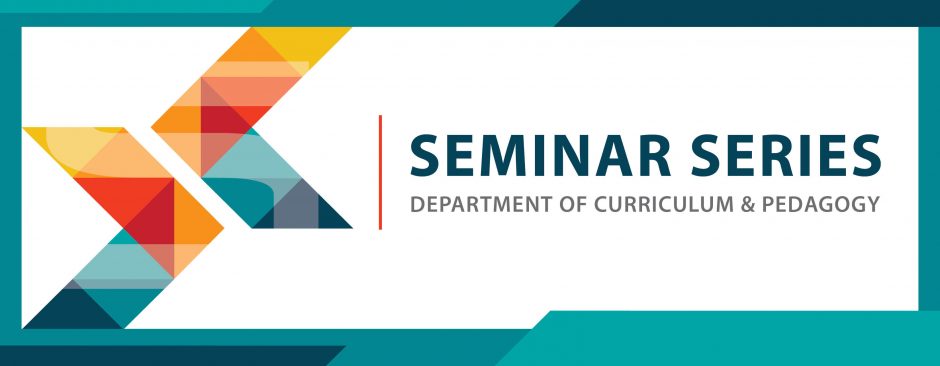
Dr. Zhang Hua | Hangzhou Normal University, Hangzhou, China
Feb 12th, 2014 | 12:30-2:00pm | Scarfe 1107
View the Seminar Poster
Abstract:
The ongoing curriculum reform in China was formally initiated in 2001, echoing the requirements of knowledge-based economy and the intrinsic calling of educational democracy in the whole society. In one decade of practical and theoretical effort, nearly all the school teachers know the ideas and ideals of “New Curriculum Reform”. That’s the main achievements of this event. From 2004 on, New Curriculum Reform has been giving rise the biggest theoretical debate in educational field in China, which is commonly called “Wang-Zhong Debate”. This debate has greatly promoted the understanding of curriculum and pedagogy in China. Where is New Curriculum Reform going? It will honestly respond the realistic claiming of educational practice, pick up the long valuable wisdom tradition (for example, Confucianism), and recover the modern tradition of educational democratization in the first part of 20th century. If so, the future of New Curriculum Reform is bright.
Short Bio:
Zhang Hua, professor and dean in Graduate School of Educational Studies at Hangzhou Normal University; former professor and deputy director in the Institute of Curriculum and Instruction at East China Normal University. He has been the president of International Association for the Advancement of Curriculum Studies (IAACS) from 2007 to 2013. He also serves National Educational Ministry in China, as the main expert for National Curriculum Reform. He is sitting at the editorial board of the journal Global Education and the journal of IAACS Transnational Curriculum Inquiry. As a Fulbright Scholar, he did Fulbright Program in Graduate School of Education at Harvard University during 2002-2003 school year. Prior to undertaking an academic career, he taught for four years in a rural middle school in China.
Zhang Hua’s research interests include curriculum studies, curriculum history, wisdom traditions (Confucianism, Taoism, Buddhism), internationalization of curriculum studies, curriculum reform, teacher education, restructuring classroom teaching, philosophy of education, and moral education. He teaches courses in the above fields like curriculum studies, curriculum reform, research-based pedagogy, teacher research and development, and so on. He has published 9 books and more than 130 papers in academic journals.
Some Authored Books
- Zhang, Hua & William F. Pinar (eds.) (2014). Autobiography and Teacher Development in China: Subjectivity and Culture in Curriculum Reform. New York: Palgrave Macmillan (in press).
- Zhang Hua. (2010). On Research-based Pedagogy. Shanghai: East China Normal University Press.
- Zhang Hua, et al. (2007). Research on Integrated Curriculum of Practical Activities. Shanghai: Shanghai Science and Technology Education Press.
- Zhang Hua & Li Yanbing (2004). The Ideal and Reality of Project-based Learning. Shanghai: Shanghai Science and Technology Education Press.
- Zhang, Hua (2000a). The Theory of Experience Curriculum. Shanghai: Shanghai Educational Publishing House.
- Zhang, Hua (2000b). The Theory of Curriculum and Instruction. Shanghai: Shanghai Educational Publishing House.
- Zhang, Hua, Shi, Weiping, and Ma, Qingfa (2000c). Research on Schools of Curriculum Theories. Jinan: Shandong Educational Publishing House.
Main Articles Published in English
- Zhang, Hua and Qiquan, Zhong (2003). Curriculum Studies in China: Retrospect and Prospect. In William F. Pinar (ed.) (2003). International Handbook of Curriculum Research. New Jersey: Lawrence Erlbaum Associates, Inc.
- Zhang, Hua (2006). On the Essence of Knowing in Teaching/ Learning. Frontiers of Education in China. Volume1, Number 2, pp. 226-257.
- Zhang, Hua (2008). Toward a Confucian Vision of Curriculum. In Claudia Eppert & Hongyu Wang (2008). Cross-Cultural Studies in Curriculum: Eastern Thought, Educational Insights. New York: Laurence Erlbaum Associates.
- Zhang, Hua (2009). The Ongoing Curriculum Reform in China: Philosophy, Objectives, and Structure. In Rope E. & Tero, A. (eds.). (2009). International Conversations on Curriculum Studies: Subjects, Society, and Curriculum. Sense Publishers.
- Zhang, Hua (2012). Turning to the Pedagogy of “Listening”. In Complicity: An International Journal of Complexity and Education. Vol. 9, No.1.
- Zhang Hua & Zhenyu Gao (2013). Curriculum Studies in China: Retrospect and Prospect. In William F. Pinar (ed.)(2013). International Handbook of Curriculum Research. New York: Routledge. (in press).
- Zhang Hua (2014). Curriculum Studies and Curriculum Reform in China: 1922-2012. In William F. Pinar (ed.)(2014). Curriculum Studies in China. New York: Palgrave Macmillian. (in press).